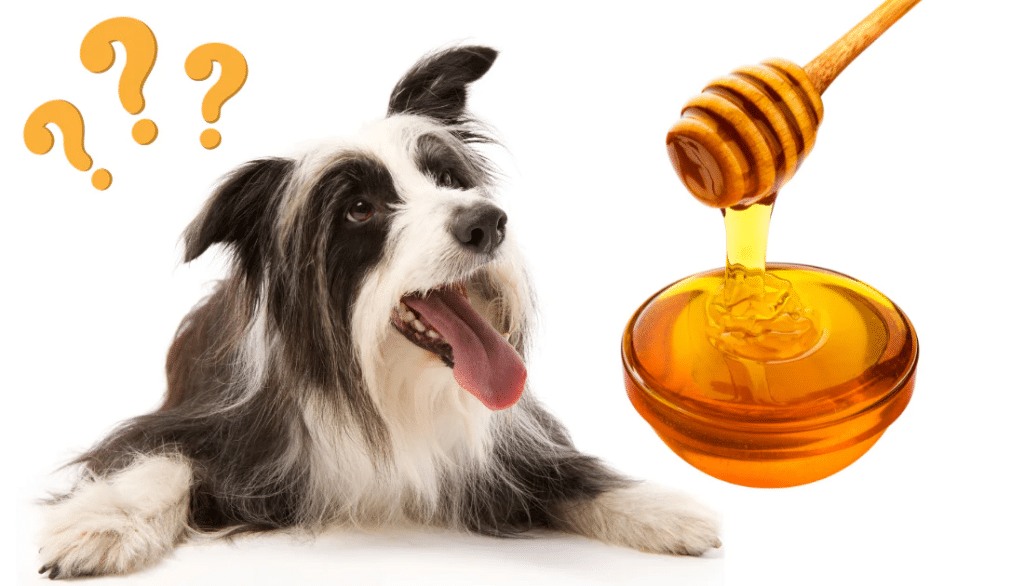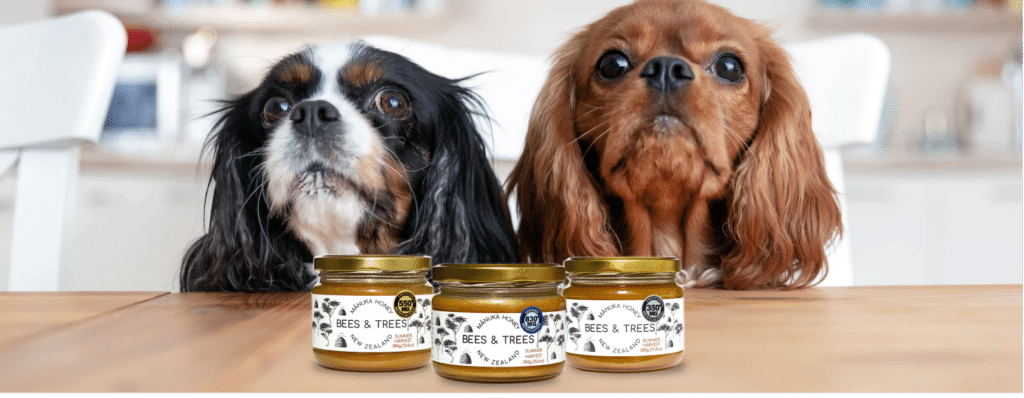If you’re a dog owner, you may find yourself wondering if it’s safe to share certain foods with your furry friend. One particular worry is honey.

Honey is a natural sweetener that humans have enjoyed for centuries, but is it suitable for our canine companions? This article explores the topic of dogs and honey, shedding light on the potential benefits and risks associated with feeding honey to dogs.
Related: How Many Cups in a Pound
You Like Your Dog, Don’t You?
Dogs are cherished members of our families, and as pet owners, we want to ensure their well-being. When it comes to their diet, it’s essential to be cautious about the foods we offer them.
Honey, a natural sweetener derived from honeybees, is widely consumed by humans and possesses several health benefits. However, the same cannot be automatically assumed for our canine companions.
Related: Chicken Noodle Soup Recipe
What is Honey?

Honey is a natural, viscous liquid produced by bees from the nectar of flowers. It is created through the bees’ regurgitation and enzymatic activity. The result is a sweet, golden substance that has been used for its taste, medicinal properties, and various culinary applications.
Honey is rich in nutrients and contains natural sugars, vitamins, and minerals. It is composed mainly of fructose and glucose, which are simple sugars that provide energy. Honey also contains trace amounts of antioxidants, enzymes, amino acids, and small quantities of vitamins such as vitamin C and B complex.
Related: Chicken Soup Recipe
Is Honey Safe for Dogs?

While honey is generally safe for humans, it’s important to exercise caution when considering feeding it to dogs. The digestive system of dogs differs from that of humans, and certain foods that are harmless to us can pose risks to our four-legged friends.
Honey has been associated with several potential benefits for dogs when consumed in moderation. Some of the reported benefits include:
1. Soothing Properties
Honey may provide relief for dogs with mild throat irritation or coughing.
2. Energy Boost
The natural sugars in honey can serve as a quick energy source for active dogs.
3. Wound Healing
Honey’s antimicrobial properties may aid in wound healing when applied topically.
Related: Gluten-free Bread
Risks and Considerations

Although honey can offer certain benefits, it’s crucial to be aware of the potential risks and considerations when giving it to dogs. These include:
1. Allergies
Some dogs may be allergic to honey or bee products. It’s important to monitor your dog for any signs of an allergic reaction, such as itching, swelling, or difficulty breathing.
2. Weight Gain
Honey is high in calories and can contribute to weight gain if not given in moderation. Portion control is key.
3. Botulism Risk
Raw honey may contain spores of Clostridium botulinum bacteria, which can cause botulism in dogs. It’s best to avoid feeding dogs, raw honey.
Related: 25+ Best Black Anime Characters
How to Feed Honey to Dogs

If you decide to feed honey to your dog, it’s crucial to do so in moderation and with certain precautions. Here are some guidelines to follow:
1. Consult Your Veterinarian
Before introducing honey into your dog’s diet, consult with your veterinarian to ensure it suits your dog’s health and dietary needs.
2. Choose Quality Honey
Opt for high-quality, pure honey without additives or preservatives.
3. Moderation is Key
Limit the honey you give your dog and incorporate it into their diet sparingly.
4. Avoid Raw Honey
Due to the potential risk of botulism, it’s best to avoid feeding dogs raw honey.
Related: Popular Nigerian Dogs and Their Strange Uses
Alternative Sweeteners for Dogs

If you’re looking for alternative sweeteners for your dog, safer options are available. Some dog-friendly alternatives to honey include:
1. Applesauce
Unsweetened applesauce can be a tasty and healthier alternative to honey.
2. Pureed Fruits
Pureed fruits like bananas, blueberries, or strawberries can add natural sweetness to your dog’s treats.
3. Coconut Oil
Coconut oil can provide a touch of sweetness while also offering potential health benefits for dogs.
Related: Simple Pineapple Cake Recipes to Bake in 30 Minutes
Honey and Medicinal Uses in Dogs

Beyond being a potential dietary addition, honey has been used in various medicinal applications for dogs. It’s important to note that any medicinal use of honey should be done under the guidance of a veterinarian. Some common medicinal uses of honey in dogs include:
1. Topical Wound Treatment
Honey’s antibacterial and wound-healing properties may aid in the treatment of minor cuts, burns, or skin irritations.
2. Cough Soothing
Honey may help soothe a dog’s throat and reduce coughing due to its natural properties.
FAQs
How much honey can I give my dog?
Honey is safe for dogs to eat in small quantities. The amount of honey that is safe for your dog to eat will vary depending on their size, breed, and age. Generally, a dog should not consume more than a teaspoon of honey daily. For small dogs (under 10 pounds), you can start with ¼ teaspoon daily and gradually increase as needed. For medium dogs (10-20 pounds), you can give ½ teaspoon per day. For large dogs (20-50 pounds), you can give 1 teaspoon per day. For extra-large dogs (over 50 pounds), you can give 2 teaspoons per day.
It is important to note that honey can cause stomach upset in some dogs, especially if they eat too much of it. If your dog experiences vomiting, diarrhoea, or other digestive problems after eating honey, you should stop giving it to them and consult with your veterinarian.
Honey can also be a choking hazard for small dogs, so it is important to supervise them closely when they are eating it. You should also avoid giving honey to dogs that are allergic to bees or other insects.
What does honey do for dogs?
Honey has many potential benefits for dogs, including:
Energy boost: Honey is a natural sugar source, which can give your dog a quick energy boost. This can be especially helpful for dogs that are active or that have been sick.
Immune system boost: Honey is a good source of antioxidants, which can help boost your dog’s immune system. This can help them fight off infections and stay healthy.
Antibacterial and antifungal properties: Honey has antibacterial and antifungal properties, which can help protect your dog from infection. This can be especially helpful for dogs with skin problems or that are prone to infections.
Soothes sore throats and stomach ulcers: Honey has a soothing effect on the throat and stomach. This can help to relieve pain and inflammation caused by sore throats, stomach ulcers, or kennel cough.
Improves skin health: Honey can help to improve skin health by moisturizing and soothing the skin. This can be helpful for dogs with dry, itchy skin or skin allergies.
It is important to note that honey can cause stomach upset in some dogs, especially if they eat too much of it. If your dog experiences vomiting, diarrhoea, or other digestive problems after eating honey, you should stop giving it to them and consult with your veterinarian.
Honey can also be a choking hazard for small dogs, so it is important to supervise them closely when they are eating it. You should also avoid giving honey to dogs that are allergic to bees or other insects.
If you are considering giving honey to your dog, it is always best to talk to your veterinarian first. They can help you determine how much honey is safe for your dog to eat and whether or not it is right for their individual needs.
Do dogs enjoy honey?
Yes, most dogs enjoy the taste of honey. It is sweet and mild in flavour, so it doesn’t overpower their palate. Honey is also a good source of antioxidants and other nutrients, so it can be a healthy treat for dogs in moderation.
However, it is important to note that honey can be dangerous for dogs if they eat too much of it. Honey can contain botulism spores, which can be harmful to dogs. Botulism is a rare but serious illness that can cause paralysis and even death. To prevent your dog from getting botulism, it is important to only give them honey that has been processed to kill the spores.
The amount of honey that is safe for dogs to eat depends on their size and weight. A small dog, such as a Toy Poodle, should only eat about ¼ teaspoon of honey per day. A larger dog, such as a German Shepherd, could eat up to 2 teaspoons of honey per day.
If you are giving your dog honey as a treat, it is best to do so in moderation and talk to your veterinarian about the appropriate amount for your dog’s needs.
Conclusion
In conclusion, while honey can offer certain benefits for dogs, it’s crucial to exercise caution and moderation when considering feeding it to them. Honey should only be given to dogs after consulting with a veterinarian and ensuring it aligns with their specific health needs.
Additionally, it’s important to be aware of potential risks, such as allergies, weight gain, and the avoidance of raw honey. By making informed choices and prioritizing your dog’s well-being, you can make responsible decisions regarding their diet.
If there are any questions, post them below.
